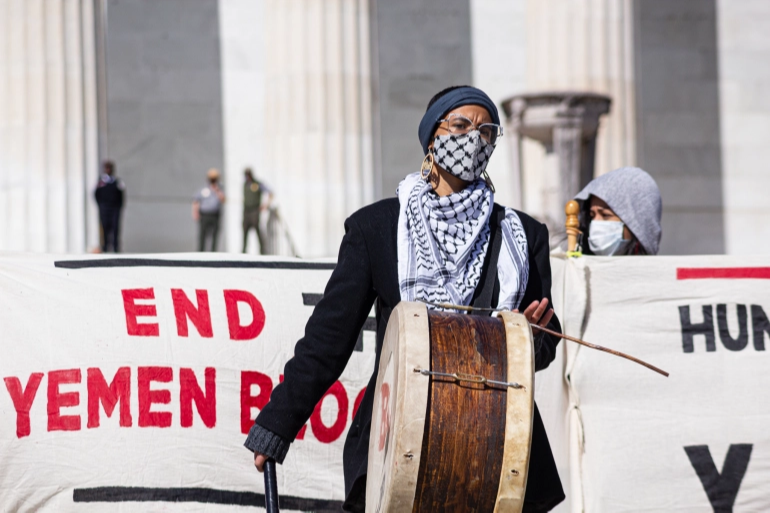
Yemeni-American activist Iman Saleh, who launched a hunger strike for Yemen in March 2020, participates in a protest in Washington, DC, the United States on April 3, 2021 [Courtesy Laura Albast]
Washington, April 15 (RHC)-- Iman Saleh has not eaten anything in 17 days. The 26-year-old Yemeni American and her younger sister, Muna, went to Washington, DC late last month from the U.S. state of Michigan to draw attention to the humanitarian crisis in Yemen, where a war has raged for six years.
Going on a hunger strike was a symbolic choice, Saleh told Al Jazeera, as millions of Yemenis are living under the threat of widespread famine amid the ongoing conflict. “We felt that the world wasn’t listening to what was happening in Yemen,” said Saleh, general coordinator of activist group Yemeni Liberation Movement. She said six activists originally joined the hunger strike, but now only she and her sister remain. They are only drinking water and water with electrolytes.
“We felt that showing the world what the body goes through when it’s in starvation … will not only bring attention and awareness to what’s going on in Yemen, but also help people understand the circumstances that Yemenis have been dealing with for years.”
The war in Yemen broke out in late 2014 when the country’s Houthi rebels seized large swaths of the country, including the capital, Sanaa. It escalated in March 2015 when Saudi Arabia and the United Arab Emirates assembled a US-backed military coalition in an attempt to restore the government of the Riyadh-backed President Abd-Rabbu Mansour Hadi.
A naval and air blockade, imposed by the Saudi-led coalition, has worsened the humanitarian crisis over the course of the war, international aid organisations and activists have said, and the United Nations warned that 16 million Yemenis will go hungry this year.
Saleh said the activists’ main demand is for the U.S. to end all support for the Saudi-led blockade of Yemen. “We just don’t really see us having a choice and really ending this [hunger strike] until the Biden administration responds,” she said.
In February, U.S. President Joe Biden announced plans to end U.S. backing of the Saudi-led coalition’s “offensive operations” in Yemen, as well as any related arms sales. But several months later, that support is still there and it remains unclear what assistance will be cut. The Biden administration has also promised to continue to help Saudi Arabia defend itself against Houthi attacks.
U.S. lawmakers have appealed to the administration to get clarity on its plan, but few details have been released. On April 6, US lawmakers urged Biden to end Washington’s support for the blockade, saying it “has long been a leading driver of Yemen’s humanitarian catastrophe, triggering fuel shortages, inflation and greatly reducing access to food, water and transportation.”
Meanwhile, aid groups continue to warn that millions of Yemenis are suffering. In February, four UN agencies said nearly 2.3 million Yemeni children under age five were expected to suffer from acute malnutrition this year – and of those, about 400,000 would suffer severe acute malnutrition and could die without aid.
“The increasing number of children going hungry in Yemen should shock us all into action,” UN Children’s Fund Executive Director Henrietta Fore said in a statement. “More children will die with every day that passes without action. Humanitarian organizations need urgent predictable resources and unhindered access to communities on the ground to be able to save lives.”
Back in Washington, DC, the hunger strike has garnered support from progressive U.S. lawmakers, including Rashida Tlaib and Ilhan Omar – the first two Muslim women ever elected to the U.S. Congress – who both met with the activists this month.
Speaking from a protest camp outside the White House during a Tuesday-evening vigil, which was livestreamed on Facebook, Tlaib urged President Biden to help Saleh end her protest. “I wish that she didn’t have to do this,” said Tlaib, a “Hunger Strike For Yemen” banner affixed to a fence behind her.
“Help her end this hunger strike. Please President Biden, help her.”
Saleh said she hoped her protest would inspire others to speak out about the situation in Yemen, too. “It’s time for everybody to call for an end to this. It’s gone way too far.”

